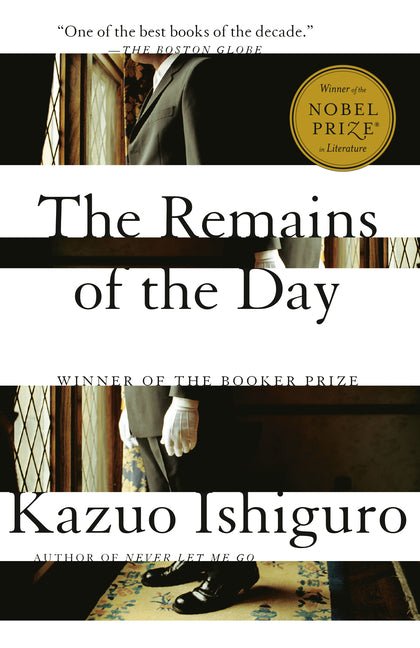Vintage
The Remains of the Day: Winner of the Nobel Prize in Literature
Couldn't load pickup availability
BOOKER PRIZE WINNER - From the winner of the Nobel Prize in Literature, here is "an intricate and dazzling novel" (The New York Times) about the perfect butler and his fading, insular world in post-World War II England.
This is Kazuo Ishiguro's profoundly compelling portrait of a butler named Stevens. Stevens, at the end of three decades of service at Darlington Hall, spending a day on a country drive, embarks as well on a journey through the past in an effort to reassure himself that he has served humanity by serving the "great gentleman," Lord Darlington. But lurking in his memory are doubts about the true nature of Lord Darlington's "greatness," and much graver doubts about the nature of his own life.
Share
Book Details
ISBN:
9780679731726
EAN:
9780679731726
Binding:
Paperback
Pages:
256
Authors:
Kazuo Ishiguro
Publisher:
Vintage
Published Date: 1990-12-09
View full details
This is one of those books that you finish, and sit there for a few minutes in silence filled with the awareness that you have just read a truly great novel. Author Ishiguro provides us with the reminiscences of a stereotypically reserved British butler. It is 1956, and Stevens is nearing the end of a long, loyal career serving the inhabitants of Darlington Hall. Lord Darlington has died, and an American has purchased the estate. The once sizable staff of 27 servants has now been reduced to three. Stevens is on a brief motor trip from Oxfordshire to Cornwall to visit the former Housekeeper of Darlington Hall, Mrs. Kenton, and is hopeful of enticing her to return with him to join his small staff.From his musings while traveling we learn that Stevens repressed every aspect of his personal feelings and values in order to do his duty as head of the household staff of the estate. Duty, loyalty and dignity are the sole values that he admits to, and they have governed his life since arriving at Darlington Hall around 1927. While his father dies in an upstairs room he cannot attend to him as he must see to it that nothing goes amiss at a large conference that is underway. His dealings with Mrs. Kenton are cold and formal, though you become increasingly aware that there are feelings developing between them that go beyond those of a usual co-worker relationship. Stevens also feels that his loyal service to Lord Darlington enabled him to play a small, but meaningful role in Lord Darlington's efforts to bring about world peace.As Stevens analyzes the past both he and the reader begin to realize that his defense of his life is falling apart. He is forced to realize that his blind support of an aristocrat may have been misguided. His denial of feelings have cost him a relationship with a woman who had fallen in love with him. Stevens has come ultimately to face the "remains of the day", that being the remaining years of his life.The style of this novel is simple and stately. It is filled with an understated eloquence that is spellbinding. This is a reality novel of the mind. For the length of the book we are privy to Stevens's thoughts as he wrestles with them, as he tries to grapple with the disturbing feelings about his life that are bubbling to the surface.Ishiguro is an incredibly talented author. This is a beautiful work of literature.
This book is a rare treasure with so many historical and cultural points of reference threaded together in the layers of Spencer's experience. Ishiguro's literary style flows seamlessly, and he delightfully reveals the internal wanderings of a man coming to the end of his life in post-WWII Britain. It was an unexpectedly worthwhile read.
The book, while seemingly detailed and wordy paints an incredible picture of early, mid 20th century England. Also, it teaches much about life. How to live it, how to feel it. The title is more perfect than one can imagine until they finish it.
At the start of this book, I questioned whether I would be able to finish it. That didn't last long before I was drawn in and felt compelled to continue. There were many parallels between this story and life today, not all of them positive, but you'd have to be blind not to see them. Would highly recommend!
Favorite quote:‘Now, look, mate, I’m not sure I follow everything you’re saying. But if you ask me, your attitude’s all wrong, see? Don’t keep looking back all the time, you’re bound to get depressed. And all right, you can’t do your job as well as you used to. But it’s the same for all of us, see? We’ve all got to put our feet up at some point. Look at me. Been happy as a lark since the day I retired. All right, so neither of us are exactly in our first flush of youth, but you’ve got to keep looking forward.’ And I believe it was then that he said: ‘You’ve got to enjoy yourself. The evening’s the best part of the day. You’ve done your day’s work. Now you can put your feet up and enjoy it. That’s how I look at it. Ask anybody, they’ll all tell you. The evening’s the best part of the day.’


